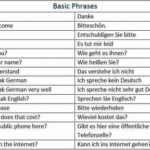 The key to learning German is to speak it. People love those who are learning their language. Imagine having the confidence to have a conversation with a native German speaker, practicing your language skills and experiencing German language and culture like you’ve always dreamed of.
The key to learning German is to speak it. People love those who are learning their language. Imagine having the confidence to have a conversation with a native German speaker, practicing your language skills and experiencing German language and culture like you’ve always dreamed of.
So you know how to say “Guten Morgen” and “Auf Wiedersehen” – that’s super cool but you are going to need a few more skills to become a master of the German language.
Here they are:
1. Word Genders
If you’re consistently getting the genders of words right, even when using different cases, then you’re onto a winner. Here’s an unusual one for you though – what is the gender of the word Gebäude (building)?
Tempted to say feminine due to the ‘e’ on the end? Gebäude is actually neuter.
2. Subordinating conjunctions
What is wrong with the phrase weil ich liebe meine Katze (because I love my cat)? The verb isn’t at the end of phrase as it should be, since weil is a subordinating conjunction.
Admittedly, this one isn’t so important when speaking, as native speakers sometimes don’t bother popping the verb to the end, but a true grammar fanatic would know of the rule and make sure they used it in their written German at least.
 3. Knowing what verbs to use with sein in the perfect tense
3. Knowing what verbs to use with sein in the perfect tense
Does saying ich bin gefahren come instinctively to you now? Do you wince a little if you hear someone say ich habe gegangen?
Getting the hang of which verbs to use with sein and which to use with haben in the perfect tense separates beginners from advanced learners of German.
4. Possessive pronouns
This just requires some memorization, but messing up can give you away as a non-native speaker.
If it’s feminine or plural, go for deren, if it’s masculine or neutral, go for dessen. For example: Die Frau, deren Katze auf dem Boden lag (the woman, whose cat lay on the floor).
5. Nach or Nachdem? Vor or Bevor?
If you’ve fully understood the difference between nach and nachdem or vor and bevor, then you’re on your way to sounding native.
As as rule of thumb, the preposition by itself is followed by a noun, eg nach dem Film, whereas nachdem is followed by a phrase with a verb, for example nachdem ich den Film gesehen habe.
6. Als or wenn?
This can prove a tricky judgement call when describing past events, but you should use als for an event that happened only once in the past, and wenn for events that happened more than once in the past.
7. The Passive
The passive in different tenses can prove to be a real head-scratcher, especially when you add in the element of modal verbs.
Is saying Ihm konnte nicht geholfen werden (he couldn’t be helped) a piece of cake? Then hats off to you.
 8. Knowing what verbs match with what prepositions
8. Knowing what verbs match with what prepositions
This truly marks out a native speaker from a German-learner. There’s not really a rule for knowing which preposition aligns with which verb, you just have to learn it.
A few useful ones are fahren nach (to travel to), warten auf (to wait for) and sich freuen auf (to look forward to).
9. Adjective endings
No matter how well you think you have learned them, when talking or writing at speed, adjective endings always seem to trip you up.
However, once you stop just hap-hazardly attaching an -en to the end of every adjective and start instinctively applying them properly, you can consider yourself pretty darned adept at German.
10. Capitalizing nouns
A classic rookie error is failing to give all nouns a capital letter. Once you’ve grasped it and you can scribble away in German without having to give it too much thought, then you know your language skills are just that tiny, little bit better than when you started.
Related articles:
Exploring the German Language Dialects
Basic German Phrases for Travelers
Essential German Phrases
Overcoming the Hardest Part of Learning German







